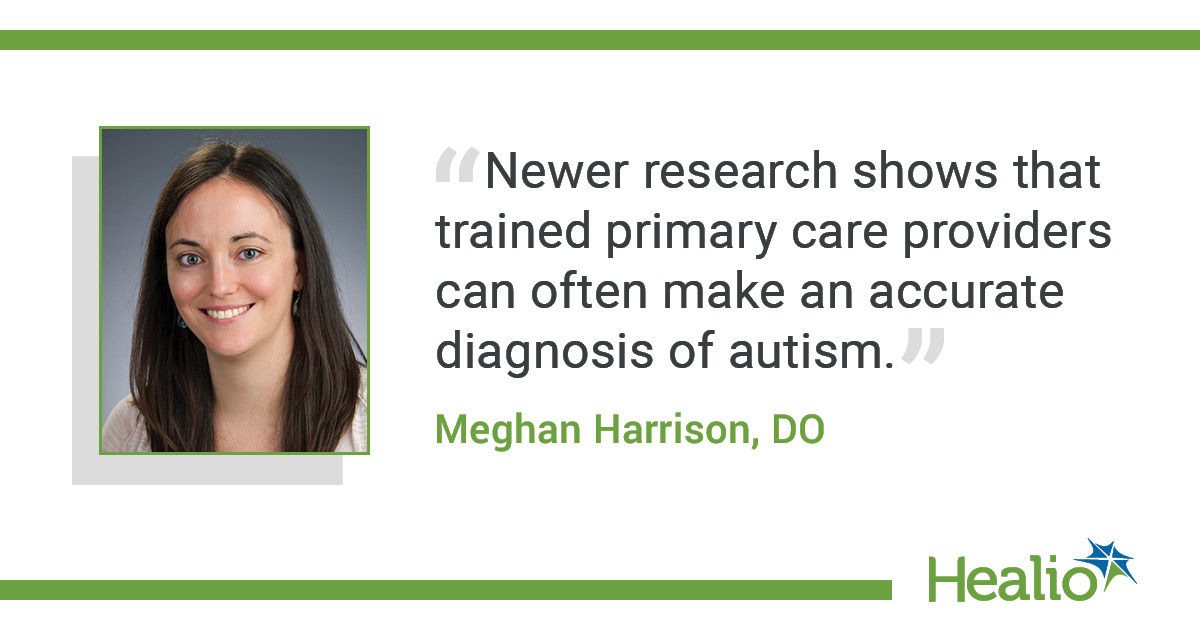Add topic to email alerts
Added to email alerts
Key takeaways:
WASHINGTON — Training primary care physicians to evaluate children for autism could improve diagnosis, a study presented at the AAP National Conference & Exhibition found.
The researchers are primary care pediatricians but also operate Nemours Children’s Health Developmental Medicine Behavioral and Developmental Access Clinic, where young children are evaluated for autism.
“Nationally, there are long wait times for autism evaluations at specialty centers,” Brittany Perry, DO, clinical assistant professor of pediatrics at the Sidney Kimmel Medical College at Thomas Jefferson University in Philadelphia, told Healio.
“Families may wait months to years for an appointment,” Perry said. “Many children are referred for autism evaluations, but there is a shortage of developmental and behavioral health providers who are trained to do them. There are known health care disparities for children in minority groups and barriers to accessing autism evaluations at specialty centers. Some children are never seen after referral.”
With the knowledge that early identification of autism leads to earlier intervention and improves outcomes, Perry and colleagues created what they called the “focused autism evaluation pathway” for young children.
If a child is identified for further evaluation, the pathway gives caregivers the opportunity to have the autism evaluation completed with a physician and a resident physician that mirrors the assessments at an autism center (AC).
“We schedule the evaluation approximately 6 to 8 weeks later and meet with the resident physician prior to the scheduled evaluation and provide extra training on autism assessment,” Perry said. “The resident physician participates in the autism evaluation with us. Our care coordinator follows up with the family after assessment.”
In March 2022, the center piloted the pathway in a primary care (PC) office for children aged older than 4 years, identified as at risk for autism by M-CHAT or provider concern. The authors compared data for 27 patients referred from the PC office, against a control cohort of 42 children from the AC group. Altogether, 70% of patients from the PC office were diagnosed with autism spectrum disorder, and the average time from referral to initial evaluation was 2 months for the PC group, nearly half of the 3.9-month gap for the AC group. Mean age at diagnosis was also significantly younger in the PC group, 27 months vs. 35 months in the AC group.
“It was clear,” Perry said, that completing autism evaluations in PC had the potential to reduce wait time to evaluation and decrease age at diagnosis, as well as making it easier to keep track of which patients are referred or still need an evaluation.
“We were not surprised by these results, but it was exciting to see these data and the positive effect felt by families, resident physicians, and our pediatrician colleagues,” Perry said.
Another of the researchers said they are interested in whether completing autism evaluations in the medical home reduces disparities in medical care.
“For some families, social determinants of health — for example, access to transportation or the internet — and language barriers contribute to difficulty scheduling, attending, and completing evaluations at a specialty center,” Meghan Harrison, DO, clinical assistant professor of pediatrics at Sidney Kimmel Medical College at Thomas Jefferson University, told Healio. “Providing autism care in the medical home could help decrease some of those barriers.”
They hope the study “encourages primary care providers to think about their own clinics and how they can best support their autistic patients and families,” Harrison said.
“Newer research shows that trained primary care providers can often make an accurate diagnosis of autism,” Harrison said. “Some may have the interest and ability to create similar autism assessment pathways, and others may desire to learn ways to engage resident physicians in autism care. Overall, we hope this work inspires pediatricians to be creative about ways to care for autistic children in the medical home.”
Harrison M, et al. Autism evaluations in primary care: An opportunity to improve access and reduce wait time. Presented at: AAP National Conference & Exhibition; Oct. 20-24, 2023; Washington, D.C.
Harrison and Perry report no relevant financial disclosures.
Added to email alerts
This content was originally published here.
